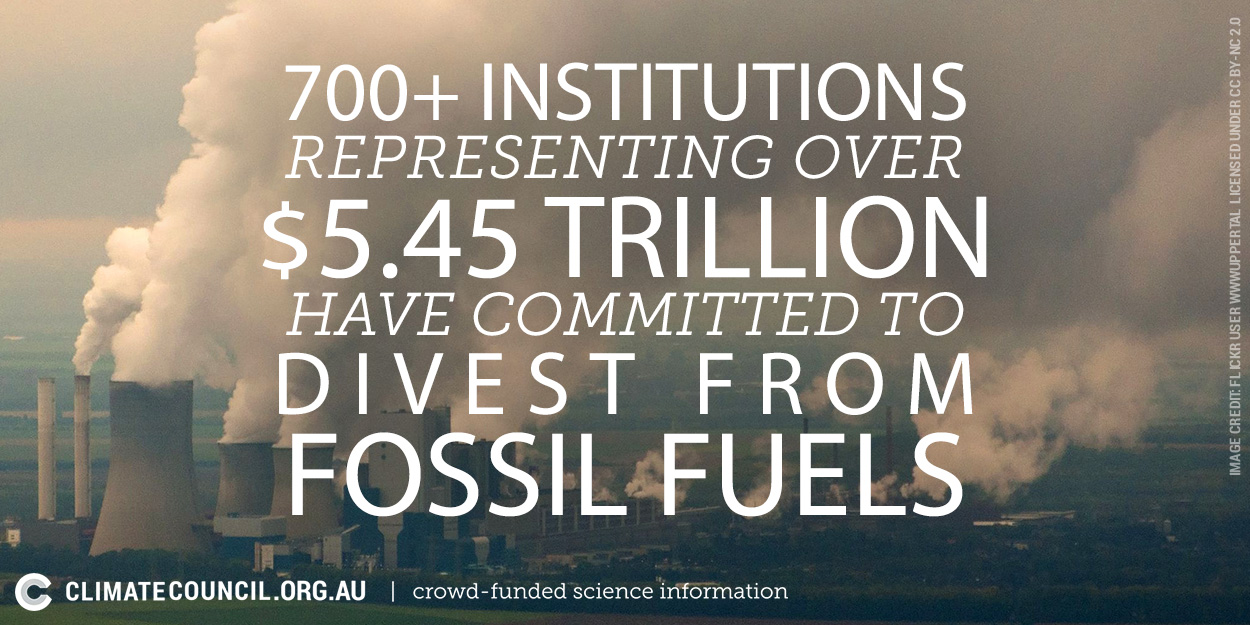What’s happening in Australia?
Westpac has raised the bar for Australia’s big banks when it comes to action on climate change, becoming the first major Australian bank to introduce restrictions on lending for new thermal coal mines.
The ‘Big Four’ bank has announced that it will no longer lend to new mines that produce less efficient, low energy coal or to new mines located in previously undeveloped coal basins. The changes appear to rule out investment in the controversial Carmichael project, and come less than a month after Westpac’s 200th anniversary celebrations were disrupted by anti-Adani protestors.
What’s happening globally?
Westpac is not alone in its efforts to distance itself from fossil fuels. Globally, the movement for fossil fuel divestment, which asks institutions to move their money out of oil, coal and gas companies, is gaining momentum.
Over 700 organisations, from Yale University to the British Medical Association, have made the commitment to divest themselves from fossil fuels. The value of institutions divesting has reached a staggering $5.45 trillion and counting.

So why are so many institutions making efforts to divest?
In order to limit the rise in global temperatures to 2oC, two-thirds to four-fifths of fossil fuels must remain buried in the ground. If fossil fuel companies continue down their current path, this target simply cannot be met.
Fossil fuel divestment aims to reduce emissions by stigmatising fossil fuel companies. In doing so, companies involved in fossil fuel extraction may feel pressured to switch their investments to the renewable energy sector. Additionally, many companies are divesting for financial reasons, due to concern that fossil fuel investments will become worthless in a world on a path to renewable energy.
Australian businesses are becoming world leaders in climate change action. In fact, Australia has the highest value of fossil fuel divestments per capita of any developed nation on the planet.
Many of Australia’s financial institutions have joined the movement, with 53 banks and credit unions in Australia having publically divested from fossil fuels. These financial institutions range from relatively major players such as Bendigo Bank, to smaller, local businesses like the Broken Hill Community Credit Union.
Additionally, many Australian universities have also taken action to divest. La Trobe, Swinburne University and the Queensland University of Technology have made comprehensive commitments to divestment, while others, such as the Australian National University, Monash and Sydney, have taken substantial steps towards this goal.
Local Governments are leading the way
Local governments have arguably been the most active in the divestment arena. Over 30 councils have divested from Fossil Fuels since 2014, which amounts to almost $7 billion in investments. These include significant investors such as the ACT government, the City of Melbourne and the City of Sydney, as well as smaller players like the Shire of Goomalling and Gloucester Shire Council.
The majority of these divestment commitments did not come about as a result of a top-down decision making approach by management; rather, they were often a result of a bottom-up approach, fronted by campaigners throughout Australia who worked tirelessly to put pressure on institutions and make their ‘fossil-free’ message heard.
For instance, Fossil Free ANU has been pushing the Australian National University to divest since 2011. The group has enjoyed many successes, the biggest of which was to convince the university to sell $16 million worth of mining shares in 2014. However, this has not been without its challenges, ranging from media backlash to university stonewalling, overcome only because of dedicated volunteers who have refused to give up.
What’s next?
Australia certainly still has a long way to go when it comes to fossil fuel divestment. None of the ‘Group of Eight’ elite universities have fully divested, and in 2016, the Big Four banks (three of which do not have divestment policies) loaned $10 billion to fossil fuel projects.
However, campaigns around Australia are gathering pace, and Australians have every reason to keep fighting. Should concerns citizens, investors and students continue to place pressure on powerful institutions, we may see many more major companies like Westpac take their first steps in dumping fossil fuels for good.